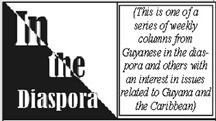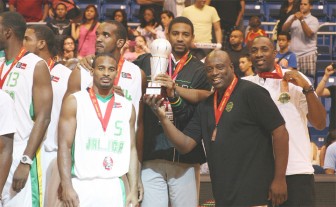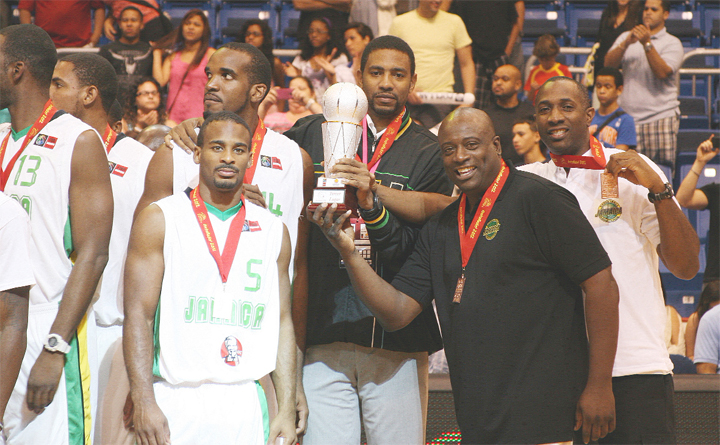Ajani Harris-Williams ne Ajani Williams serves as the current president of the Jamaica Basketball Association. He is a co-founder of a technology company that boasts over 300,000 mobile subscribers in Jamaica and he also manages sports rights for companies (eg. 361 Degrees) and track and field athletes. Ajani played collegiate (Georgia Tech/Eastern Michigan) and pro basketball (Europe, Asia, Minor Leagues, stints in the NBA) and also graduated with a degree in Mathematics and minor in Physics from Eastern Michigan University.
By Ajani Harris-Williams
Jamaica, like many developing countries, faces a daunting task building a nation that is prosperous and which provides clear pathways of opportunity for people and their talents. Another difficult task is in sustaining successful development decade after decade, generation after generation. What I have come to recognize through my own successes and failures and also by playing and administering the game of basketball and founding a technology company, is that sports like other disciplines such as engineering, software development or even the arts, share similar DNA in how they evolve, develop and facilitate the building of stronger societies.
 Some years ago Jamaica’s basketball faced a dilemma, which culminated around a few core issues: a lack of renewal and succession planning; a distorted culture within the governing body and therefore the entire body of basketball throughout the nation; lack of exposed expertise; inefficient, inconsistent or non-existent implementation or execution of policies and strategies; and the difficulty of standing for something unequivocally irrespective of perception. Whether we are talking about the game of basketball, or life, those elements must be tackled, monitored and re-invented.
Some years ago Jamaica’s basketball faced a dilemma, which culminated around a few core issues: a lack of renewal and succession planning; a distorted culture within the governing body and therefore the entire body of basketball throughout the nation; lack of exposed expertise; inefficient, inconsistent or non-existent implementation or execution of policies and strategies; and the difficulty of standing for something unequivocally irrespective of perception. Whether we are talking about the game of basketball, or life, those elements must be tackled, monitored and re-invented.
Imagine a basketball team that never drafted new players. Imagine a team where players hardly retired. Imagine teammates that didn’t like to pass the ball or preferred passing to the opposing team to prevent a fellow player from receiving the credit. Imagine a center playing the point guard position. What if Brazil didn’t possess the courage of humility, to understand that some of the best agricultural education at the time wasn’t domiciled within their borders but in the US and so chose to invest in sending the country’s best and brightest to learn abroad and return home to leverage their new found expertise, later becoming the number one soybean producers in the world and also strengthening their tertiary institutions with a broader knowledge base.

The transformation of basketball in Jamaica in just 3 years came with an awareness of the challenges (recognition is the first step) and committing to pursue, with an athlete’s perseverance, the corrective measures for real change. It was immediately clear that this would be a team effort, comprising persons with special talents to complement each other in the pursuit of a particular defined goal, much like going for a championship ring. This meant recruiting a strong executive board with the clear understanding that this was not a permanent job or lifelong position, but a role for a period of time to pursue a collective mission.
This approach was underwritten constitutionally; with term limits to ensure that no-one, irrespective of rank or contribution, could overstay her/his welcome. It is crucial that everyone retire within a reasonable time frame to allow new ideas to develop and future genius to flourish.
One immediate issue before us was a persistent culture of fear that was linked to perpetual assaults on the character of persons serving. This was halted with a combination of attacking with facts, leaving personal agendas behind in order to pursue the development of basketball relentlessly and without doubt. This eventually wore down the forces of divisiveness and dissipated the grey cloud of fear, and instilled in the organization a sense of confidence of purpose and potential.
While the culture was being reset, we were able to innovate, to create grand, but reachable visions because the members of the Board including myself had enough expertise to get basketball in Jamaica to the next level. Not only did we have the raw talent, but many of us were educated in the game and in tertiary institutions locally and globally. Members had been successful in various aspects of their personal and professional lives and had international exposure both professionally and in the game of basketball, adding a significantly different perspective in approach, vision, innovation and our ability to implement.
Leadership, I have learned over the course of my tenure as President of the Jamaican Basketball Association (JBA), has many dimensions. In cases where I felt that critical solutions and immediate fixes were needed in the short term, I took the chance of incubating or even implementing a fix and then invited everyone to join in to see it through. This is how the Jamaica Basketball Elite Academy was founded. It was a response to an emergency situation that at the time I felt should not be allowed to continue another day. In other instances, consensus was the order of the day and the implementation of a solution was done through the process of vetting by the Executive Board, which often meant debate and strong lobbying of ideas with facts, which would eventually lead to an agreement on a plan of action and its implementation. This was the case with our National Team Sports Policy, which helped to reshape the culture and conduct of people working for or with our institution.
The lesson I have learned from this is that it is important to understand the difference between these approaches, and to know what works for a given situation. The people of a nation, should, in similar fashion to coaches, be prepared to bench players/representatives for consistent non-performance and lack of implementation of the plays designed for a successful game. This all has to be done within a system of respect and care, but care and respect should never compromise the principles of excellence and commitment. Without the courage to assess and make self or imposed adjustments in a quantifiable, fair, merit and effort-based system, there is inevitable loss for the entire team.
In technology, much like sports, successful companies started through innovation, imagination, effort and courage. Those who were involved found the courage to create products or services that they felt would make a difference. They chose building value over individual wealth. They chose to disrupt industries, sometimes making obsolete, inefficient, incompetent or arrogant giants of a particular industry, for the sake of making something special, that would be of value to the world and humanity and they did this without apology. Examples of these are Google, Apple, Microsoft and even Facebook. To me, building a country has a lot in common with building a great basketball team or a great technology company, innovating, recruiting talent and inspiring people to find their higher potential in order to create a product or platform of opportunity for success. Most importantly, is changing the environment and culture and habits from one of mediocrity and failure, to one of higher performance and improving success. There are challenges and obstacles and even opponents for the countries of the region to strive and push and practice and play for a better, brighter outcome, but not doing anything which is equivalent to not playing or not competing is inexcusable.
The Jamaica Basketball Association has been transformed in the following areas over the last three years:
– The local Men’s League, National Basketball League “NBL” which was nearing collapse was resuscitated, expanding from 12 Kingston-based teams to 27 teams across the island, with games and highlight shows being broadcast weekly on satellite television and featured weekly in the newspapers. The NBL primary/prep school reading program was also instituted and also had “Patois to English” sessions for children. It began on the premise that English is a second language to many in Jamaica and made it fun and empowering in mastering the language. This NBL has created a platform for local talent to shine and for families to have healthy, safe, sports entertainment at home or at the arenas.
-The local Women’s League received its largest sponsorship to date, resuscitating an old brand called the Women’s Super League and expanding with teams in rural Jamaica which made for some of the most exciting and competitive basketball in the country for either gender.
-The National Men’s Team won the Caribbean Championships in 2009. We recruited, signed and aggregated the best Men’s Team in Jamaica’s history, with 5 registered NBA players including an NBA All Star (Roy Hibbert Jnr) and 2 home grown talents (Samardo Samuels and Jerome Jordan). We medaled in the Centro Basket Tournament in Puerto Rico in 2012, therefore qualifying for the Tournament of the Americas in 2013, a World Championship qualifying tournament. This stands as the highest level Jamaica has ever attained in its 50+ years of basketball, which will most likely now rank the men’s team for their first time, though our women’s team has been ranked for many years.
-The Women’s National Team won their first game ever in the Tournament of the Americas in 2011 and moved up in rank from 48th in the world to 35th. Our women’s team has been number one in the Caribbean for over 6 years.
-We founded the Jamaica Basketball Elite Academy, which offers specialized attention in academics, basketball development and mentorship to 30 boys and girls. This is the only known Elite basketball Academy of its kind currently in the region and definitely the only one that employs novel techniques in both personal and skill development. Seven players in two years have earned scholarships to the US directly from this academy.
-We founded the National Mini Clinic, a weekend clinic on Saturdays with 50-100 kids in each clinic across 9 regions in Jamaica. This clinic was held for almost 4 months and was funded by a grant from the US Embassy in Kingston.
-We consummated two Memoranda of Understanding Agreements with our two finest tertiary institutions, Utech and the University of the West Indies, moving the local games indoors and also finding a home for our Elite Academies and programs.
-Jamaica Basketball Association never experienced a recession during the period 2009-2012 as its revenues from private sponsors like FLOW (Jamaica’s leading internet and cable company), fast food outlets (KFC and BK), Diageo (beverage company), and the US Embassy in Kingston, grew to $25M JA or about $300K USD per annum from 1/5 of that prior to 2009. Significantly, this created over 50 new direct part time jobs annually.
– There are over 85 total high schools now participating in our school league and we have launched an adopt-a-court program which will see private public partnerships in upgrading outdoor courts across the island. Our objective is to have all schools with high quality outdoor courts so that games may be played on premises to help build school unity, encourage healthy sports rivalry and provide in school entertainment for all across Jamaica.
I consider myself a child of the region. Some twenty years ago I spent my CXC year in Guyana where I got 9 ones and twos. It remains one of the best years of my life. The friendships I made there and the warmth of Guyanese people inscribed in me the fact that I am also a Caribbean man and that we all need to celebrate each other’s history which is more similar than dissimilar and work towards a successful Caribbean future. The success that we are now seeing in Jamaican basketball is something I would love to see expanded across the region, and to collaborate with others to achieve this in their island and countries. A strong Jamaica and weak region is not on the table, in fact it is and should be unthinkable. Much like building Jamaica Basketball, finding the right people and partners in each region who are motivated to implement and innovate will be the exciting challenge for the future.

